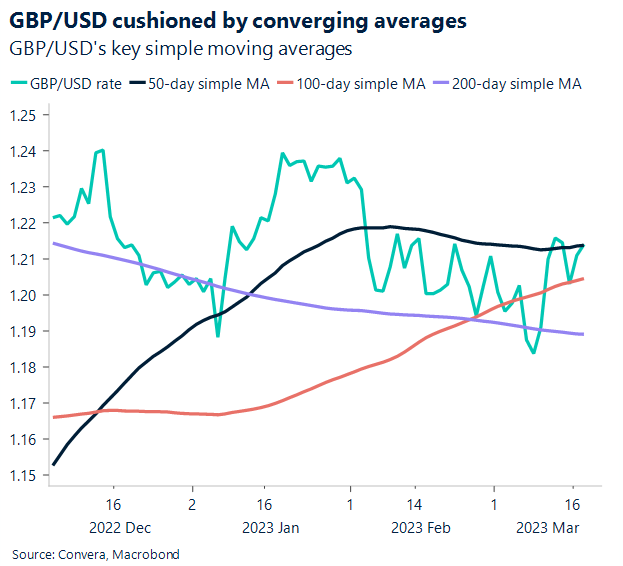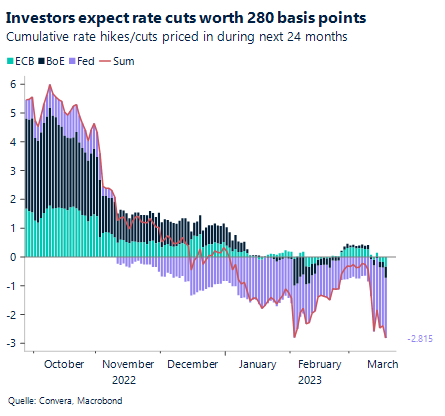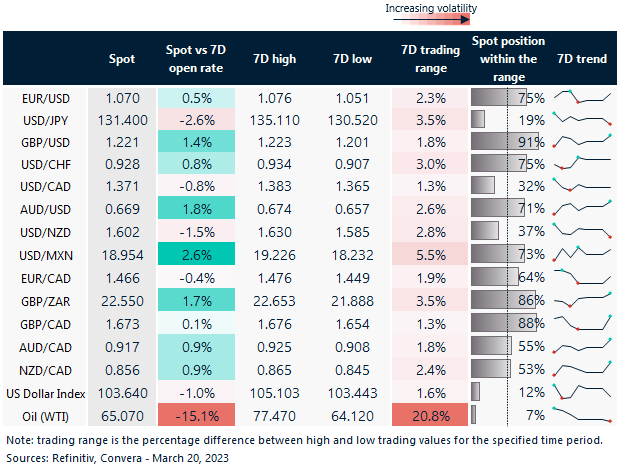Swiss banking giant UBS took control of the troubled Credit Suisse in a deal that European regulators hope will avert a full-blown banking crisis. Further supporting confidence was the coordinated central bank action to enhance the provision of US dollar liquidity. Focus remains on the fluid situation in the banking sector as the US Federal Reserve’s (Fed) policy decision looms on Wednesday.
The Fed lent more money to banks last week than it did at the peak of the 2008 financial crisis. The rapid response by global regulators to shore up market confidence, has been met with a lack of optimism though. Investors are still scooping up safe haven bonds, gold and the Japanese yen. What appears to be hurting risk sentiment now is concerns over global banks’ additional tier 1 bonds, after a Swiss regulator said $17bn of such notes from Credit Suisse will be wiped out. Markets are likely to remain on edge for some time and it just shows that the overall situation across financial markets can change so quickly. The Fed’s meeting is likely to be the week’s key event with markets divided over whether the central bank will continue to tighten policy in the middle of a rolling banking crisis. There’s currently a 60% probability that the Fed won’t hike at all this week.
Meanwhile, close to three 25-basis point rate cuts are seen by the end of the year, which is weighing on the strength of the US dollar. If the Fed surprises markets with a rate cut this week, we could see the dollar depreciate swiftly, but such a dovish move is unlikely.

BoE hike could be last in this cycle
After a rollercoaster week last week for the pound, swinging with global risk sentiment, attention turns to the Bank of England’s (BoE) meeting this Thursday. Will the BoE halt its long run of interest rate hikes or push them up again? The pound may not react positively either way, but a pause is likely to be most damaging for the UK currency.
Currently money markets are pricing a slightly higher chance that the BoE will leave rates unchanged, but we expect a majority of the Monetary Policy Committee will vote for a 25-basis point rate rise. But following banking sector turmoil in the US and elsewhere, much depends upon market movements over the next few days. Even absent the risk that financial conditions could now tighten excessively, the case for another hike in borrowing costs has weakened. Surprise falls in services inflation, moderating private sector pay growth, lower energy prices, and reassuring survey evidence mean the risk that high inflation will prove persistent is diminishing. However, momentum in the economy has been more robust than expected, which the Budget’s fiscal loosening will support. Therefore, a hike on Thursday is still possible, but this could be the last one of the current hiking cycle. The pound might therefore be more sensitive to global events and how the Fed behaves.
The macro uncertainty and market volatility may support the US dollar in the short-term, but the likely recession in the US and the rising probability of Fed cuts in the second half of the year might send both GBP/USD and EUR/USD up significantly again.


Banking will be a drag, but crisis can be averted
Banking crises are frequently associated with big short-term hits to GDP. Academic studies of large samples of banking crises estimate that on average they cut the long-term level of GDP by 5%-10%. Banking crises can further depress economic activity by pushing up long-term interest rates due to the high fiscal costs of cleaning up banking sectors after crises. How long might this turmoil drag on and what could the implications be this time around?
Banking crises tend to be associated with sharp tightening in bank credit standards, so as bank loans typically finance about 20% of investment in major economies, this can have substantial effects on GDP growth. Smaller banks matter because they account for around a third of domestically-chartered bank assets We will be closely monitoring the situation but there are a few necessary conditions that would need to be met to warrant a banking crisis. First, stress in the banking system would need to spread to medium and/or large size banks. Another condition would be deficient or delayed provision of central bank liquidity. Finally, concerns about widespread bank funding with clear knock-on effects on the availability of credit would need to spike.
Nevertheless, even if these conditions aren’t met, the vulnerabilities of the banking sector are likely to lead to tighter credit conditions, which is likely to weigh on resilient labour markets. This could be the straw that broke the camel’s back and send economies into recession. Although this could spur haven JPY and USD buying, it could also prompt interest rate cuts and spur risk taking later this year.

JPY 2.6% up versus USD since last week
Table: 7-day currency trends and trading ranges

Key global risk events
Calendar: Mar 20 – Mar 24

Have a question? [email protected]
*The FX rates published are provided by Convera’s Market Insights team for research purposes only. The rates have a unique source and may not align to any live exchange rates quoted on other sites. They are not an indication of actual buy/sell rates, or a financial offer.



